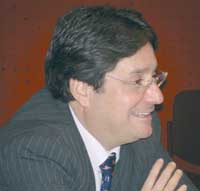Colombia says it is cracking down on paramilitaries
 Geneva - Colombia's Vice President Francisco Calderon defended his country's human rights record on Wednesday, saying crackdowns on drug runners and paramilitary groups continued and "impunity is being reduced."
Geneva - Colombia's Vice President Francisco Calderon defended his country's human rights record on Wednesday, saying crackdowns on drug runners and paramilitary groups continued and "impunity is being reduced."
Speaking after he appeared for a periodic review of his country, under the auspices of the UN's Human Rights Council, Calderon also said he hoped the United States would enter into a free trade deal with Colombia.
"Once they get the full picture, the reality of the situation, they will be able to see the effort of the Colombian government and state," he said, rebuffing calls from rights groups to the United States not to sign the deal due to allegations of ongoing abuses.
Human Rights Watch wrote in a recent report that Colombia had the worst record of any nation when it came to killings of trade union members.
Calderon admitted that there has been a surge in the last year, with at least 41 unionists killed. But he blamed "criminal elements" for those deaths. Rights activists have said these elements, in part, represented resurgences of paramilitary groups.
Journalist and human rights workers have also been targeted, with many killed. Advocacy groups have in the past complained that the government was backing certain right-wing paramilitary units.
Calderon said that these criminal groups were "totally integrated into drug trafficking," and were different than the paramilitary groups, which the government was working to disarm.
The vice president added that steps were also being taken to improve the rights record of the military itself.
Colombia said it cut murder rates by half, since 2002, and kidnappings by 87 per cent. However, the country estimates that some 3,000 people are still held hostage in the country, about 700 by the Armed Revolutionary Forces of Colombia, or FARC.
Calderon also waved off criticisms that the government was hampering efforts to bring paramilitary personnel to justice and that only a small percentage of militia members were facing trials.
"No peace process has had as much justice as this one," the vice president said, referring to the ongoing attempts to negotiate with various armed groups in the country.
A shadow report by non-governmental organizations to the Human Rights Council and diplomats' questions during the periodic review, also focused on other issues, including the continued use of child soldiers by the government and militias and the rights of the African and indigenous people.
Rights groups also criticized the left-wing militias for targeting civilians during fights with each other. They also criticized government troops and for using land mines.
The ongoing violence has also created one of the largest internally displaced populations in the world. According to official UN estimates, nearly 2 million people are displaced. However, unofficial numbers add another million.
The two-year-old universal period review programme of the Human Rights Council requires each country's rights record to be checked once every four years. (dpa)